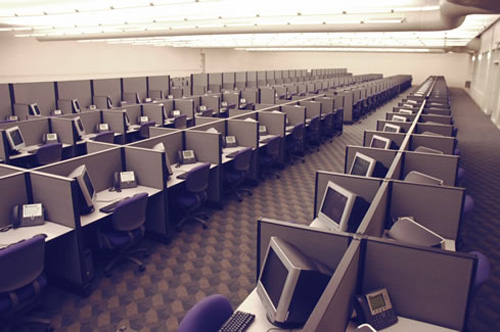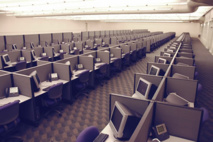But very few bosses thought of workers who often need solitude to reflect and talk privy about personal and business issues.
The destruction of the walls and physical boundaries between staff led to the fact that the responsibility for the establishment of covert boundaries, to which they have the right to interfere in the work of the neighbor, lay on their shoulders. Thus they had little rules and regulations on how to do it. The openness prevailed over privacy, and this has led to constant work interference and strife. Moreover, especially in the US, devices and programs tracking the performance of employees, what they do during the day and even their conversations are getting more widespread. Perhaps, the process of changing rooms for open workspaces has gone too far?
Steelcase company, producing such tracking devices recognize that progress would have overdone. Senior analyst Melanie Redman refers to studies: privacy has became a more acute problem in the last decade. The reason for that is number of factors, including the forced cooperation. - When people are being pushed all the time to the team work, benefits of individual thinking, essential for innovation, are lost - says Redman. - In addition, employees are not able to control who looks over their shoulder at the computer screen, who hear their conversations, who see them devouring cake, while they are on a diet. We know a lot of stories, when colleagues with interest overheard the conversation without asking or watched someone else's to-do list.
As a result, one of the workers' skills become the alignment of psychological boundaries. It goes in two directions - to protect themselves from interference by others and not to interfere in the lives of others. If the boundaries are too hard, people become isolated and even go in yourself. If the barriers are inadequate, employees feel helpless and vulnerable. People with increased sensitivity may misinterpret what is happening and provoke conflicts from scratch.
There are characters, which may be badly affected by the constant presence of people around. Susan Kane in her book about introverts "Silence" explains that these people cannot tolerate an open-plan offices because of their noise and distractions. Extroverts enjoy such a plan, but introverts show the best results in a private room.
Ethan Bernstein, associate professor of leadership and organizational behavior at Harvard Business School, is convinced that the open plan hinders cooperation and interaction. He does not believe in its contribution the development of the discussions., Bernstein followed personal interaction between employees in one of the companies who switched to the open space. Those who do not work in a team, communicated personally by 47% more. As soon as people find themselves in a team, communication fell by 45%.
The feeling that they are constantly within eyeshot, creates so strong sense of insecurity and anxiety in people that they cannot go beyond the ordinary.
- The desire to conform to others' expectations restricts the personality and innovative thinking, - says Bernstein. Under strange looks, people even change their style of work. Chiefs like to say what they want diversity, innovation, experimentation from their subordinates, and at the same time put them in a situation where they least likely to express these qualities.
Many distractions do not benefit managers themselves. One of the executives, working in the media sphere, admits that he has less time to think about the problems: "Some people think that if you sit near, you can be asked on various issues. It is not easy to tell others that you are not able to talk now."
Redman believes that, despite all the advantages of an open plan, it is necessary to strike a balance between work in small offices and public spaces.
The need arises in different areas, depending on what you are currently working on. During training or early stages of setting a project, the less people, the better. But in the later stages of the project, you can get much more benefit from a large team around. "The main conclusion of our study is that there is no single solution - says Redman. - Everything depends on the circumstances of a particular person, the current task, and even mood." Office culture is once again changing, she believes, companies begin to appreciate not openness but flexibility of the workspace. “Later personal cabinets were considered as a status symbol, but now the choice becomes a status thing.”
source: ft.com
The destruction of the walls and physical boundaries between staff led to the fact that the responsibility for the establishment of covert boundaries, to which they have the right to interfere in the work of the neighbor, lay on their shoulders. Thus they had little rules and regulations on how to do it. The openness prevailed over privacy, and this has led to constant work interference and strife. Moreover, especially in the US, devices and programs tracking the performance of employees, what they do during the day and even their conversations are getting more widespread. Perhaps, the process of changing rooms for open workspaces has gone too far?
Steelcase company, producing such tracking devices recognize that progress would have overdone. Senior analyst Melanie Redman refers to studies: privacy has became a more acute problem in the last decade. The reason for that is number of factors, including the forced cooperation. - When people are being pushed all the time to the team work, benefits of individual thinking, essential for innovation, are lost - says Redman. - In addition, employees are not able to control who looks over their shoulder at the computer screen, who hear their conversations, who see them devouring cake, while they are on a diet. We know a lot of stories, when colleagues with interest overheard the conversation without asking or watched someone else's to-do list.
As a result, one of the workers' skills become the alignment of psychological boundaries. It goes in two directions - to protect themselves from interference by others and not to interfere in the lives of others. If the boundaries are too hard, people become isolated and even go in yourself. If the barriers are inadequate, employees feel helpless and vulnerable. People with increased sensitivity may misinterpret what is happening and provoke conflicts from scratch.
There are characters, which may be badly affected by the constant presence of people around. Susan Kane in her book about introverts "Silence" explains that these people cannot tolerate an open-plan offices because of their noise and distractions. Extroverts enjoy such a plan, but introverts show the best results in a private room.
Ethan Bernstein, associate professor of leadership and organizational behavior at Harvard Business School, is convinced that the open plan hinders cooperation and interaction. He does not believe in its contribution the development of the discussions., Bernstein followed personal interaction between employees in one of the companies who switched to the open space. Those who do not work in a team, communicated personally by 47% more. As soon as people find themselves in a team, communication fell by 45%.
The feeling that they are constantly within eyeshot, creates so strong sense of insecurity and anxiety in people that they cannot go beyond the ordinary.
- The desire to conform to others' expectations restricts the personality and innovative thinking, - says Bernstein. Under strange looks, people even change their style of work. Chiefs like to say what they want diversity, innovation, experimentation from their subordinates, and at the same time put them in a situation where they least likely to express these qualities.
Many distractions do not benefit managers themselves. One of the executives, working in the media sphere, admits that he has less time to think about the problems: "Some people think that if you sit near, you can be asked on various issues. It is not easy to tell others that you are not able to talk now."
Redman believes that, despite all the advantages of an open plan, it is necessary to strike a balance between work in small offices and public spaces.
The need arises in different areas, depending on what you are currently working on. During training or early stages of setting a project, the less people, the better. But in the later stages of the project, you can get much more benefit from a large team around. "The main conclusion of our study is that there is no single solution - says Redman. - Everything depends on the circumstances of a particular person, the current task, and even mood." Office culture is once again changing, she believes, companies begin to appreciate not openness but flexibility of the workspace. “Later personal cabinets were considered as a status symbol, but now the choice becomes a status thing.”
source: ft.com



















